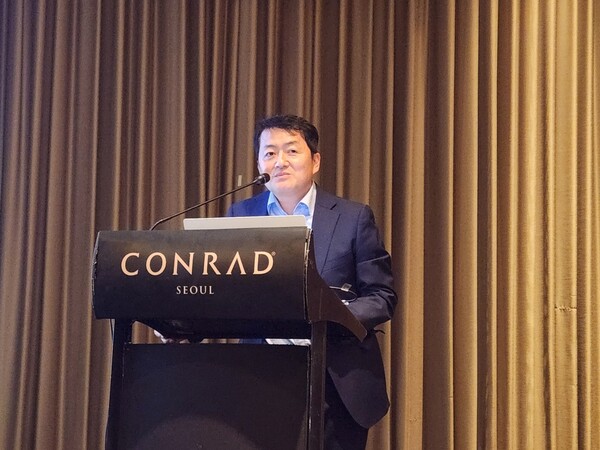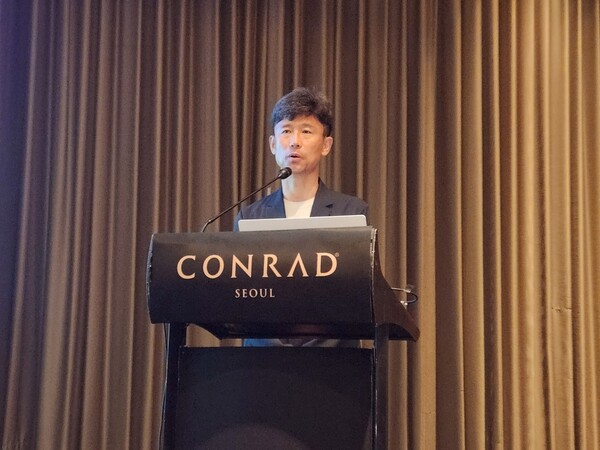Genome&Company, a prominent name in the microbiome domain, has underscored its robust progress in the realm of cancer research.
Genome&Company co-CEO Pae Ji-soo said the company would seek a technology transfer for two of its anticancer candidates by the year's end.
This decision is attributed to dual motives: securing funds and establishing a substantial presence as a significant contributor in the field of oncology.
The company's focal point lies in transferring cutting-edge technology for its GEN-104 and GEN-111 anticancer drugs.

At the press conference, Pae highlighted the pipeline direction and its corresponding business model at the Conrad Hotel in Yeouido, Seoul on Monday.
GENA-104 is a first-in-class immune checkpoint inhibitor that inhibits a novel target, CNTN4, that suppresses T-cell responses on tumor cells. Pre-clinical research has already confirmed its anti-cancer effect and the company is expected to file a phase 1 IND in August.
Meanwhile, its other candidate, GENA-111, which is also in discussions for out-licensing is a novel antibody-drug conjugate (ADC) targeting CD239. It is currently being developed in collaboration with Debiopharm, a Swiss-based biopharmaceutical drug developer.
In particular, the company said that it will accelerate research and development with the goal of technology transfer in the preclinical stage by focusing on new targeted ADCs.
Genome&Company Head of New Drug Research Center Cha Mi-young expressed that there is a huge unmet need as 80-90 percent of cancers are not responsive to immune checkpoint inhibitors.
"We have confirmed that CNTN4, the target of GENA-104, is highly expressed in PD-1 non-responders and exclusively expressed with PD-L1 in various cancers," said Cha."On the other hand, CD239, the target of GENA-111, is also highly expressed in cancer cells compared to normal cells and has high potential for being developed as a new ADC."
Cha also revealed that the company plans to explore alternative ADC targets, by moving away from conventional targets such as HER2 and TROP2.
Genome&Company’s Chief Data Officer Park Kyung-mi also explained how the company will use its proprietary GNOCLE platform to develop new microbiome and cancer drugs.
"We plan to discover new microbiome candidates by developing a strain bank by screening for species-specific properties and basic safety,” said Park.
She also revealed that the clinical trial of immuno-oncology microbiome drug, GEN-001 is progressing smoothly, and the company plans to present phase 2 cut-off data at GI ASCO in January next year.
“We are working equally hard on our microbiome and oncology pipelines,” said co-CEO Pae Ji-soo. “Microbiome and immuno-oncology pipelines share the same platform technology and we will prove our technology with licensing-out deals shortly.”
Pae also mentioned that GEN-001, which is in phase 2 trials as a combination drug with MSD’s Bavencio (ingredient: avelumab) for gastric cancer is expected to complete patient recruitment and medication within the third quarter and the other combination trial with MSD’s Keytruda (ingredient: pembrolizumab) for bile duct cancer will begin patient administration also in the third quarter.

Acknowledging that the oncology field brings high rewards but also high risks, co-CEO Hong Yoo-seok said that the company plans to balance diversification of its assets and clinical programs, with prioritization of the assets with the greatest return on investment and commercial opportunities.
"We will continue R&D of microbiome therapeutics based on securing funds from CDMOs and consumer businesses in the microbiome sector, and in the field of new targeted anticancer drugs, we will focus on new targeted ADCs in the short term and aim for early technology transfer," he said.
Related articles
- Genome&Company, HEM Pharma strengthen ties to accelerate microbiome drug discovery
- KoBioLabs suspends P2a trial of ulcerative colitis drug
- CJ Bioscience to launch global microbiome analysis platform next year
- GI Biome, ProGen to work on next-gen obesity treatment
- Genome&Company targets 2nd-line treatment for biliary tract cancer, launches phase 2 trial

